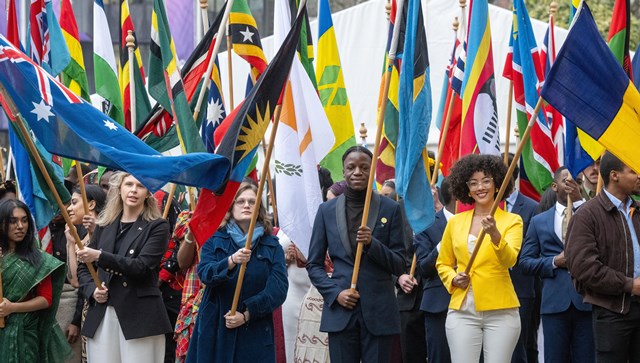 Flag bearers representing the 56 Commonwealth member states outside Westminster Abbey on 11th March, 2024. [photo: Commonwealth Secretariat]
Flag bearers representing the 56 Commonwealth member states outside Westminster Abbey on 11th March, 2024. [photo: Commonwealth Secretariat]
Sandwiched between International Women’s Day (on 8 March) and St Patrick’s Day (on 17 March), Commonwealth Day, which in 2024 takes place on Monday 11 March, can easily be overlooked. It is, of course, a day of celebration of shared values and diverse cultures – but not the joyous, street-filled and green-tinted festivities involved in proclaiming Irish identity. Similarly, the Commonwealth may marvel at its multiplicity of global networks, its people-to-people linkages, the fifty-six governments currently in membership and the many more Commonwealth and civil society organisations which contribute to its current activities. But its celebratory events may not hold the sense of passion and urgency which women across the world feel as they take stock of the many challenges they still face (from poverty and discrimination to violence and abuse) on the road to gender equality.
Yet the Commonwealth is still worth celebrating and deserving of our gratitude and support. Indeed, some will highlight that this year marks the 75th anniversary of the London Agreement of 1949, which opened the way for the transformation of the association into a multicultural and diverse body, spanning the globe. In official eyes, this is the start of the modern Commonwealth. Yet, although the seeds of change were planted in 1949, it was the appointment of the Commonwealth’s first Secretary-General, and the creation of the Commonwealth Secretariat, in March 1965, which in reality marked the birth of the new Commonwealth of Nations. Up until that point, an ‘imperial’ Commonwealth was run by the British government in its own interests, as the then membership of white South Africa and permissive attitudes to the growing horrors of apartheid so vividly testified. South Africa’s exit from the association in 1961 (after the Sharpeville massacre the year before) and growing fears of Rhodesian independence under white minority rule increased the pressure for change. It was therefore the notion of an impartial Secretary-General and Secretariat, at the service of all governments, which gave substance to the idea of an association of sovereign and equal nations, freely co-operating in the pursuit of a better world.
The Commonwealth Day Service at Westminster Abbey:
Commonwealth Day activities – from the Royal Family website (includes the King’s Commonwealth Day message).
Nearly sixty years on, that noble vision of a new Commonwealth looks increasingly battered by current events. The nations of the world are deeply divided by the war in Ukraine and the human catastrophe in Gaza. Coming soon after the global pandemic, the cost-of-living crisis, the high cost of energy and increasing debt have seriously impacted many, particularly developing countries. Politics has become more isolationist and authoritarian. In these circumstances, the United Nations and its agencies struggle to maintain their political relevance and their programmes of emergency relief. It is hardly surprising that the Commonwealth, as a ‘soft power’ organisation – and one of option rather than obligation – experiences similar difficulties in sustaining its reach and its modest resources.
It has other problems too. The Commonwealth Games, arguably the most visible and best celebrated point of Commonwealth connection, has yet to find a replacement host for the 2026 Games after the withdrawal last year of Victoria, Australia. The Commonwealth Games Federation has been sounding out alternatives, with Malaysia most recently mooted as a replacement host. In 1998, Malaysia hosted a highly successful games, the first Asian country to do so. Even so, two years is a short lead time for mounting an international sporting event of this size and complexity, even if much of the infrastructure could already be in place.
Samoa makes resilience CHOGM’s theme as fight over financing looms
Commonwealth Day 2023: The year of the youth
Commonwealth Heads of Government are due to meet in Apia, Samoa in October for their biennial summit, the first time the meeting has been held in a small island Pacific state. While the fifty-six member countries eligible to attend is a record, there is some anxiety that a declining number will be represented by their Head of Government. However, interest in the meeting will be boosted by the selection of a new Commonwealth Secretary-General to follow Patricia Scotland who steps down in April 2025. Scotland narrowly fought off a challenge to her second term at the Rwanda CHOGM in 2022, though because of the pandemic she will have completed nine years in office by the time she retires. In another recent development, the Prince of Wales is expected to represent the Head of the Commonwealth, Charles III, who is currently being treated for cancer.
The theme of the summit emphasises the importance of resilience and will resonate with many member countries facing the increasing impact of climate change. But resilience will also be necessary in reasserting the reputation, value and relevance of the Commonwealth as an instrument of soft power. Joseph Nye, who in 1990 popularised the concept, recently wrote that the turning away from soft power by governments reflected ‘their narrow time horizons rather than a secular decline in the importance of soft power.’ At a moment of re-set, it is now time for the Commonwealth to prove Nye right – and re-make its future as a force for good in the world.
Stuart Mole is the President of the Commonwealth Association and a member of the Round Table editorial board.
Related articles:



